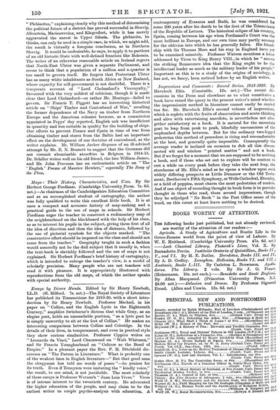Essays by Divers Hands. Edited by Sir Henry Newbolt, LLD.
(H. Milford. 7s. net.)—The Royal Society of Literature has published its Transactions for 1919-20, with a short intro- duction by Sir Henry Newbolt. Professor Mackail, in his paper on "Collins, and the English Lyric in the Eighteenth Century," amplifies Swinburne's dictum that while Gray, as an elegiac poet, holds an unassailable position, "as a lyric poet he is simply unworthy to sit at the feet of Collins." He makes an interesting comparison between Coffins and Coleridge. In the details of their lives, in temperament, and even in poetical style they show curious similarities. Professor Cippico writes on "Leonardo da Vinci," Lord Charnwood on "Walt Whitman," and Sir Francis Younghusband on "Culture as the Bond of Empire." In a pleasant paper the Rev. P. H. Ditchfield dis- courses on "The Parson in Literature." What is probably one of the weakest lines in English literature—" But that good man the clergyman has told me words of peace "—he praises for its truth. Even if Tennyson were imitating the "kindly voice," the result, to our mind, is not justifiable. The most scholarly of these essays is Professor Watson% "Juan Luis Vives." Vives is of intense interest to the twentieth century. He advocated the higher education of the people, and may claim to be the earliest writer to couple psycho-analysis with education. A contemporary of Erasmus and Bud& he was considered for some 200 years after his death to be the first of the Triumvirate of the Republic of Letters. The historical eclipse of his country, Spain, coming between his age when Ferdinand's Court was the most brilliant in Europe, and our own time may partly account for the oblivion into which he has generally fallen. His friend. ship with Sir Thomas More and his stay in England have yet to be examined minutely. Professor Watson mentions a letter addressed by Vives to King Henry VIII., in which he "asserts the striking Renascence idea that the King ought to be the intellectual leader as much as the military leader of his people." Important as this is to a study of the origins of sociology, it has not, we fancy, been noticed before by an English writer.


































 Previous page
Previous page